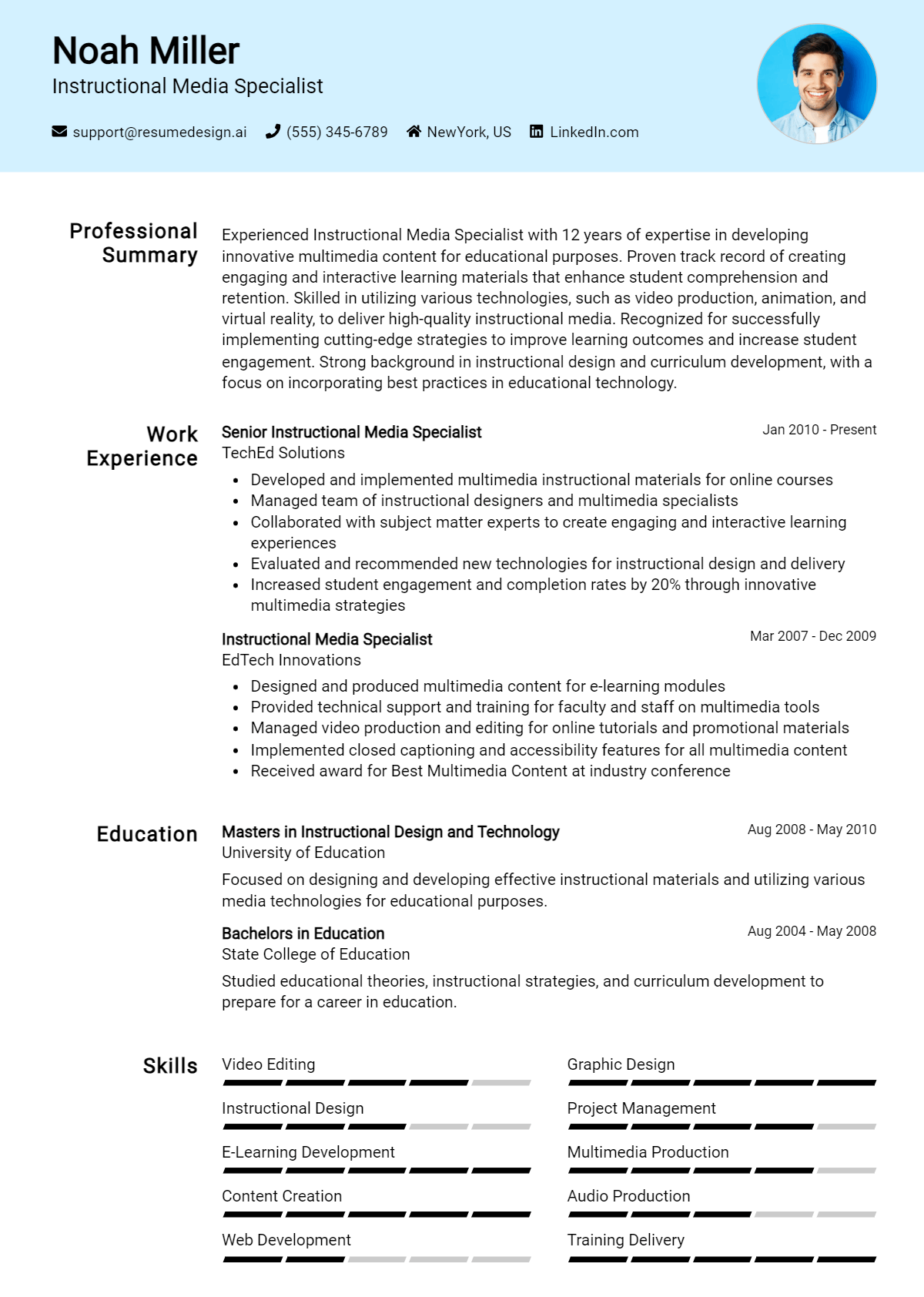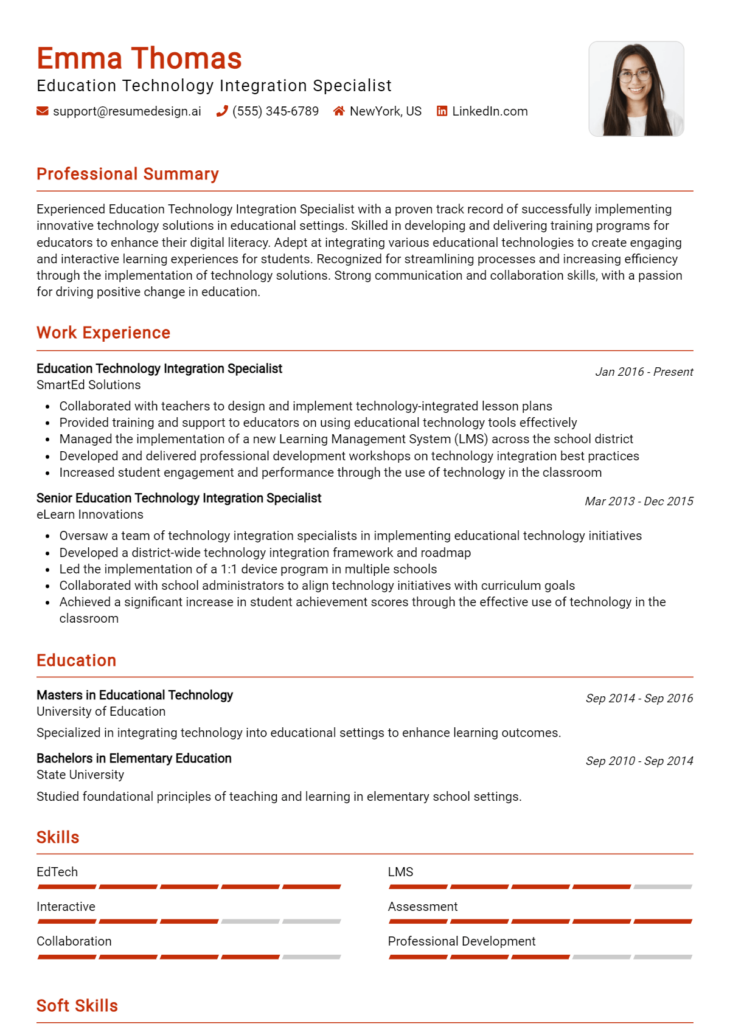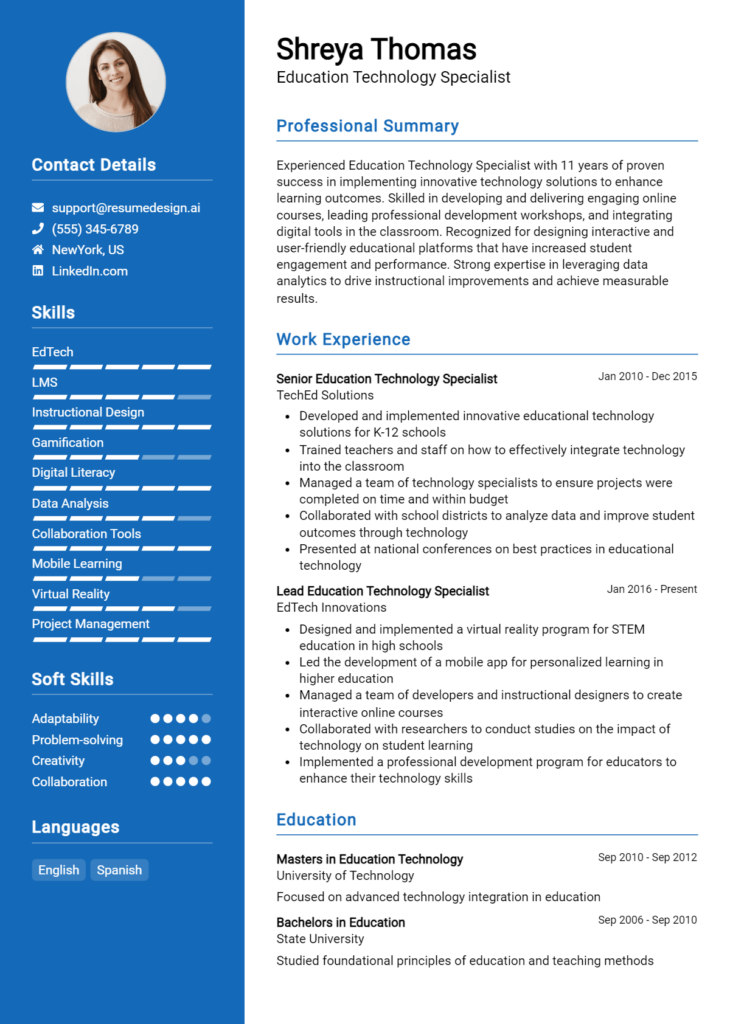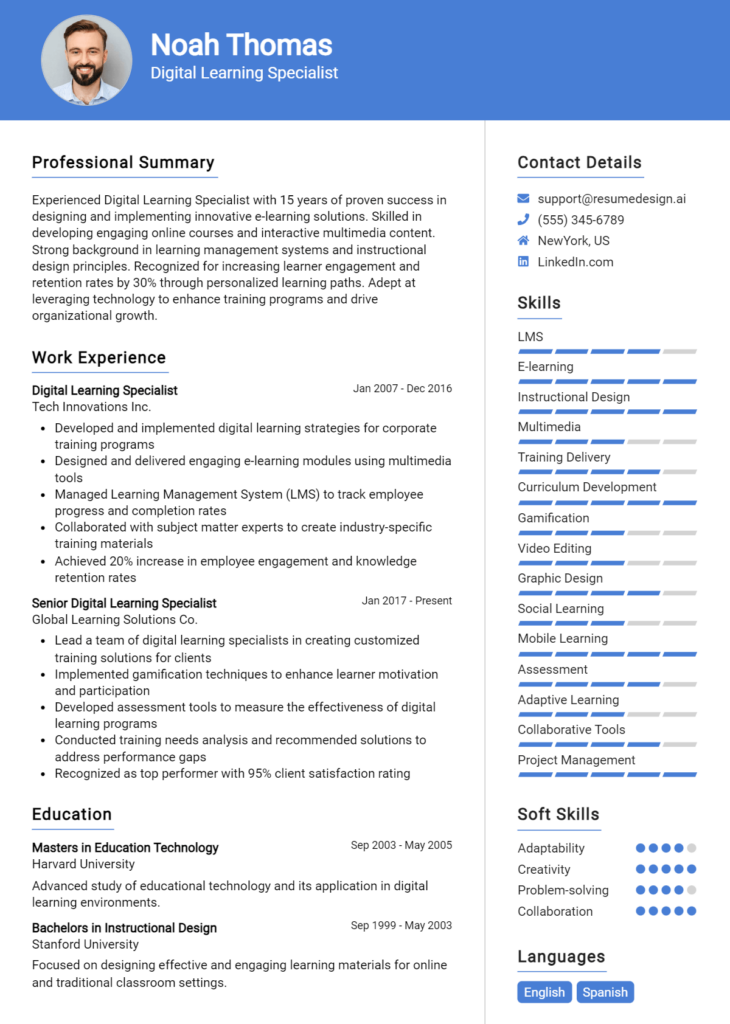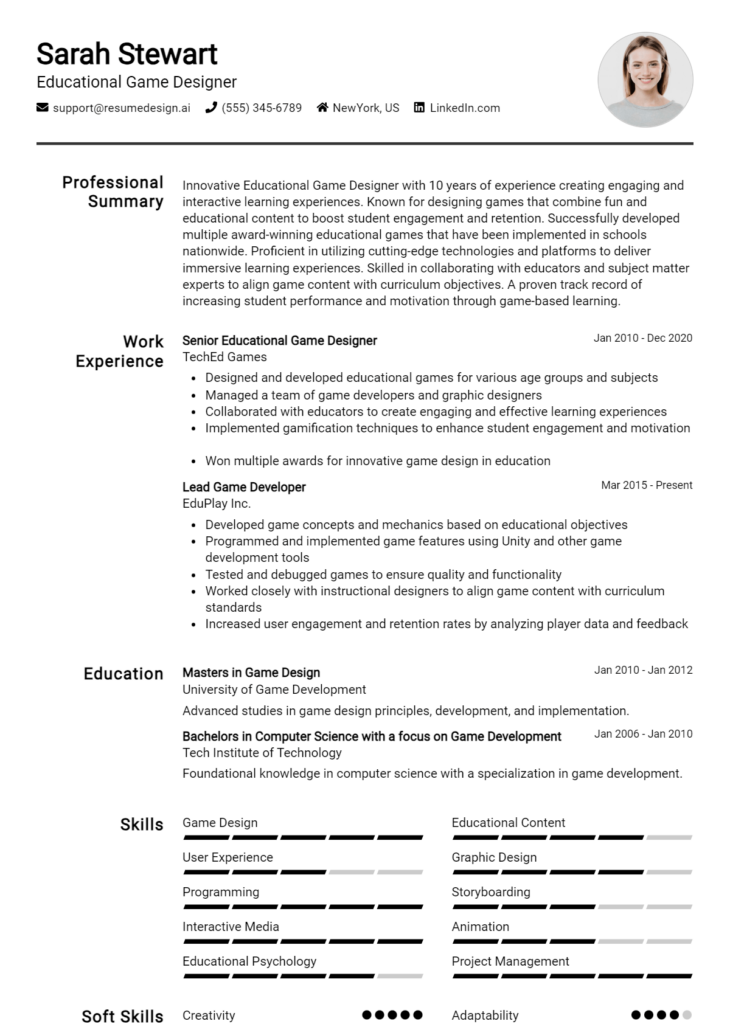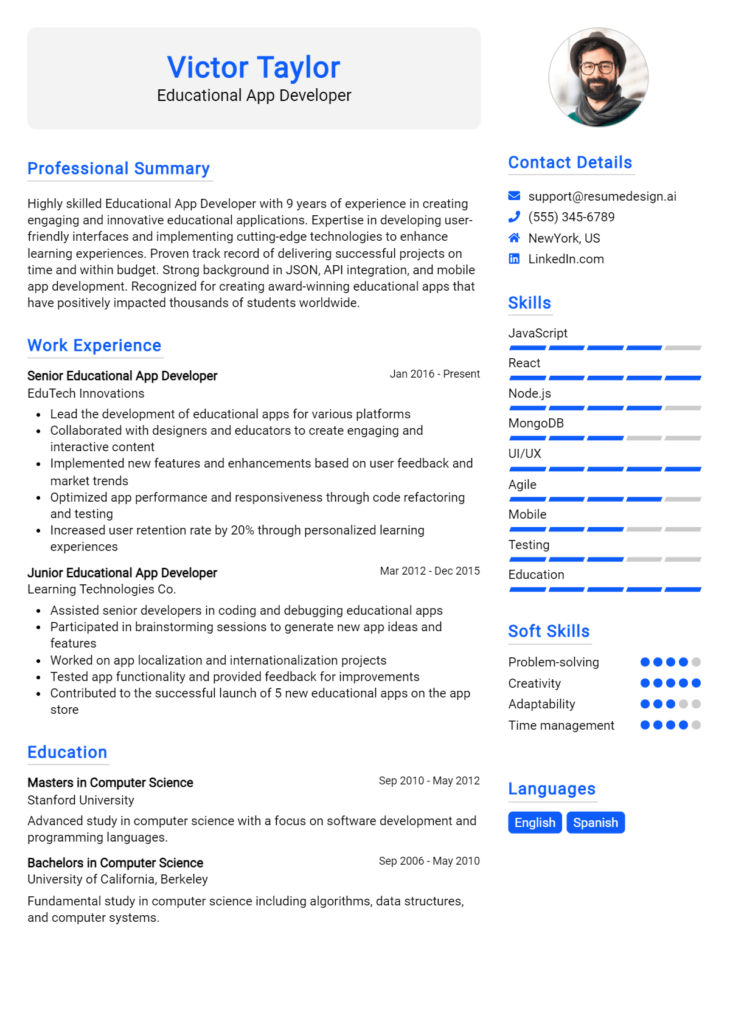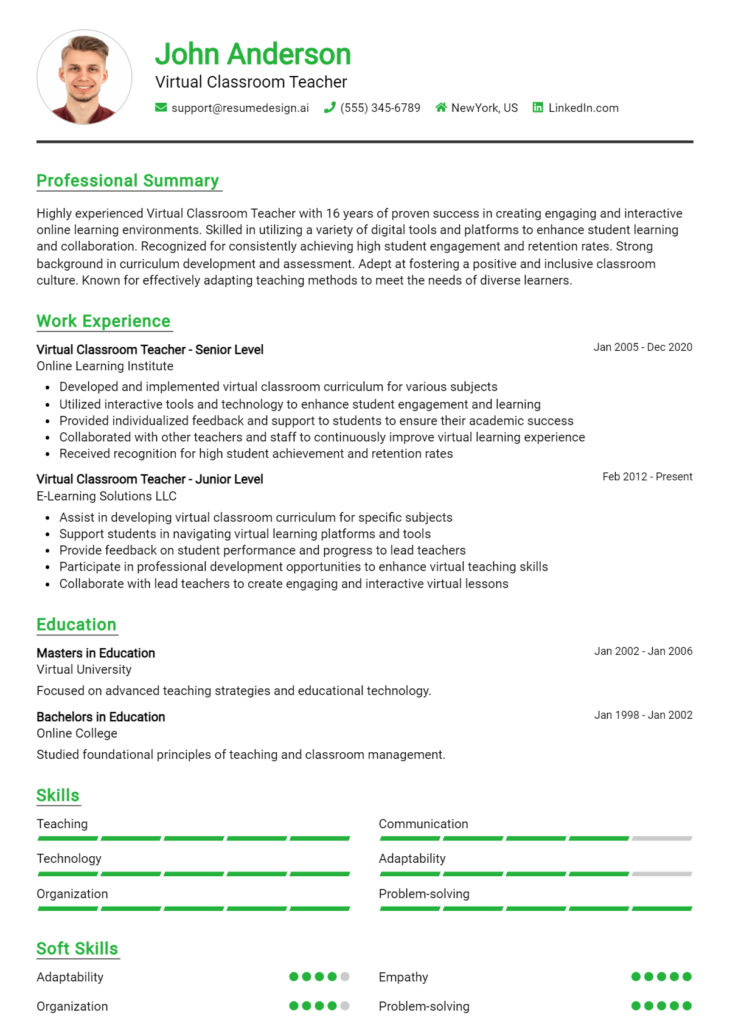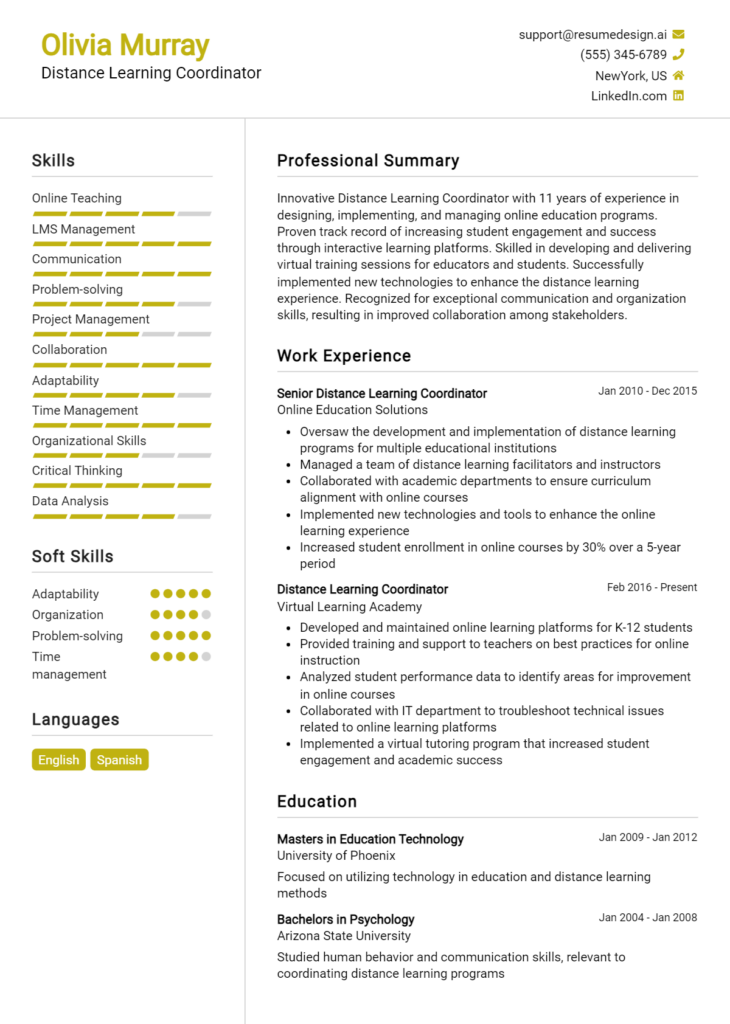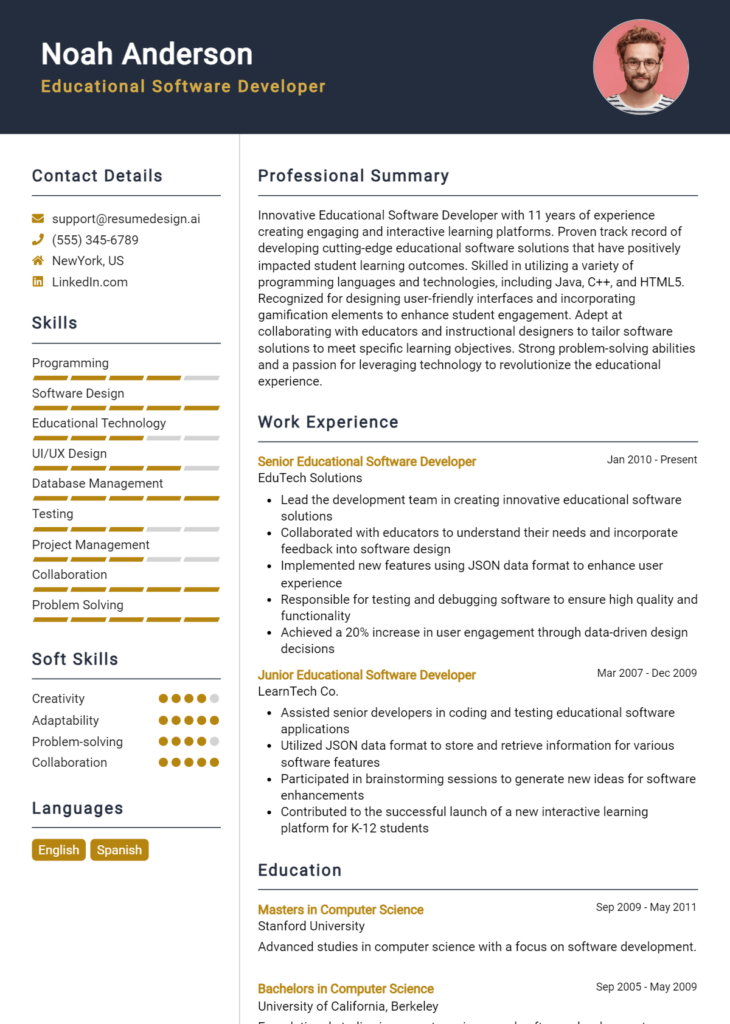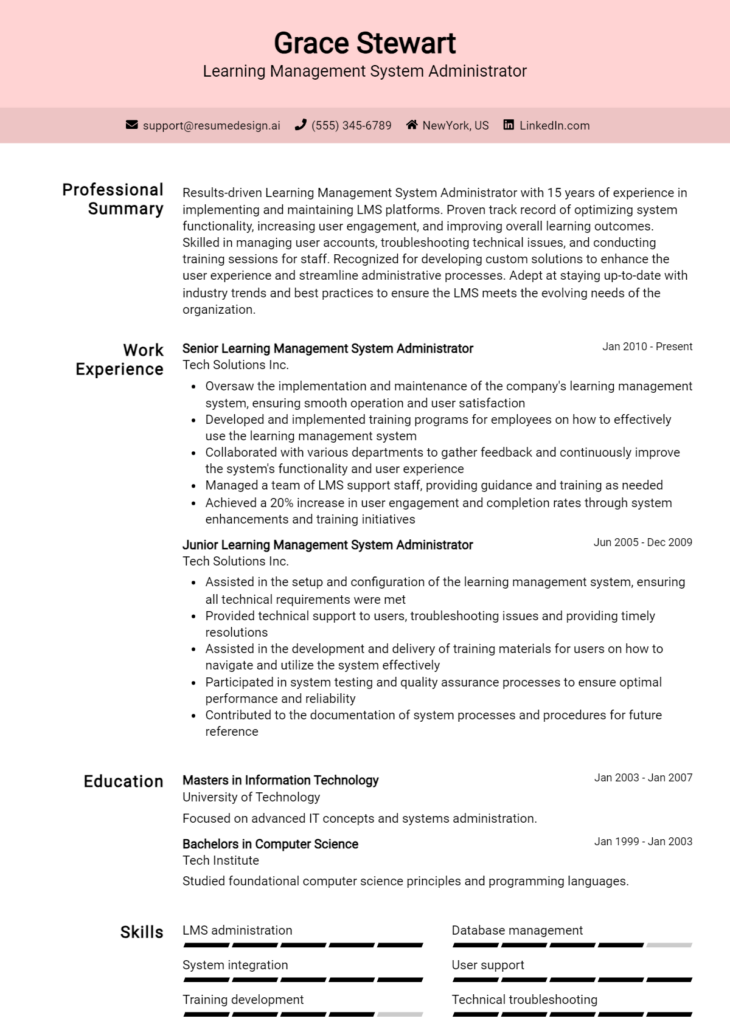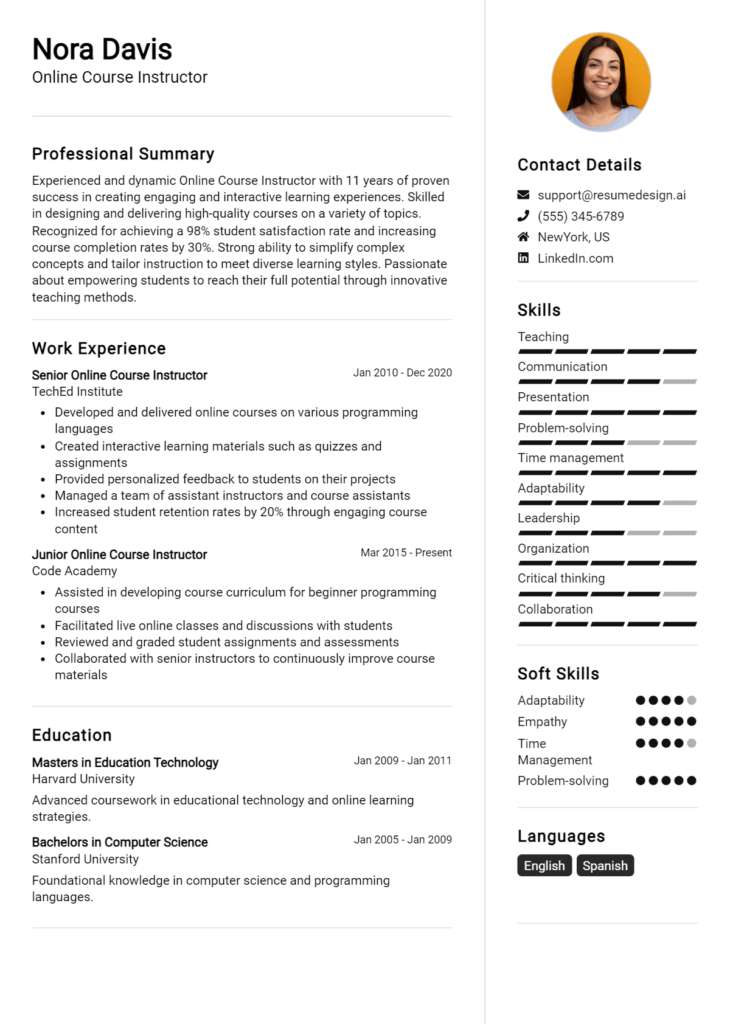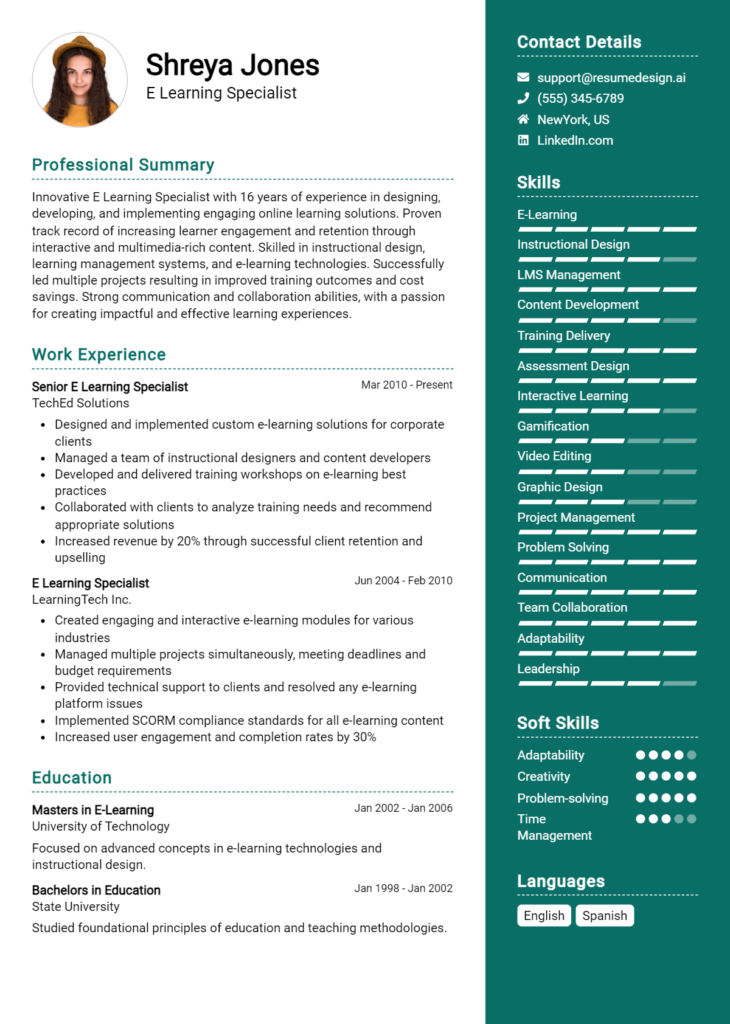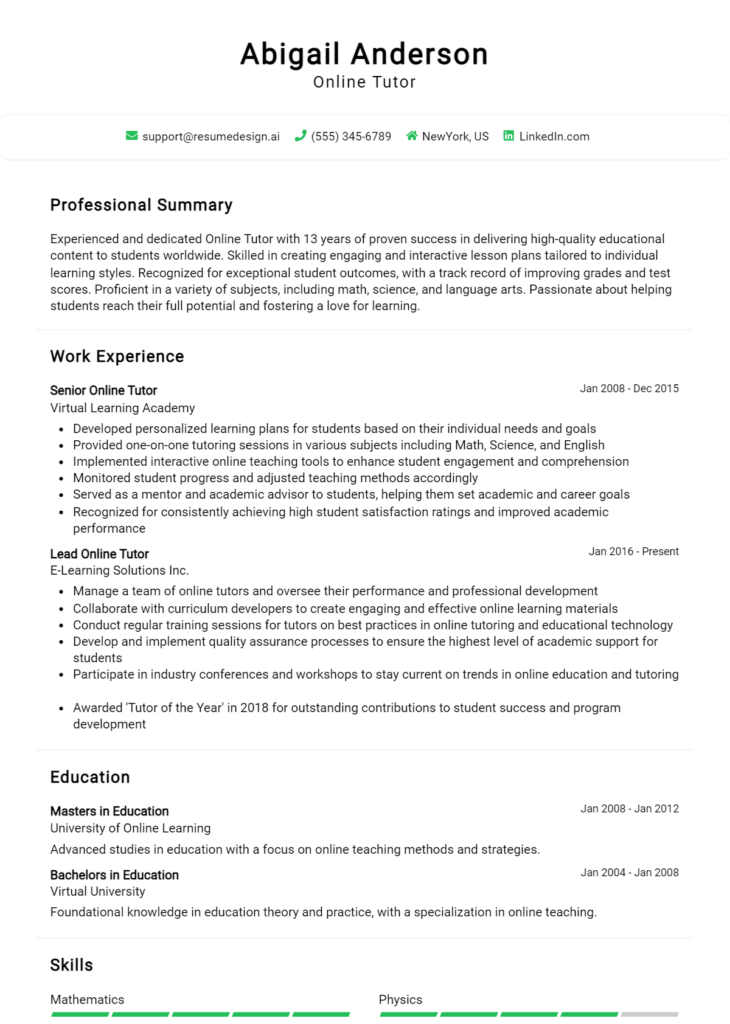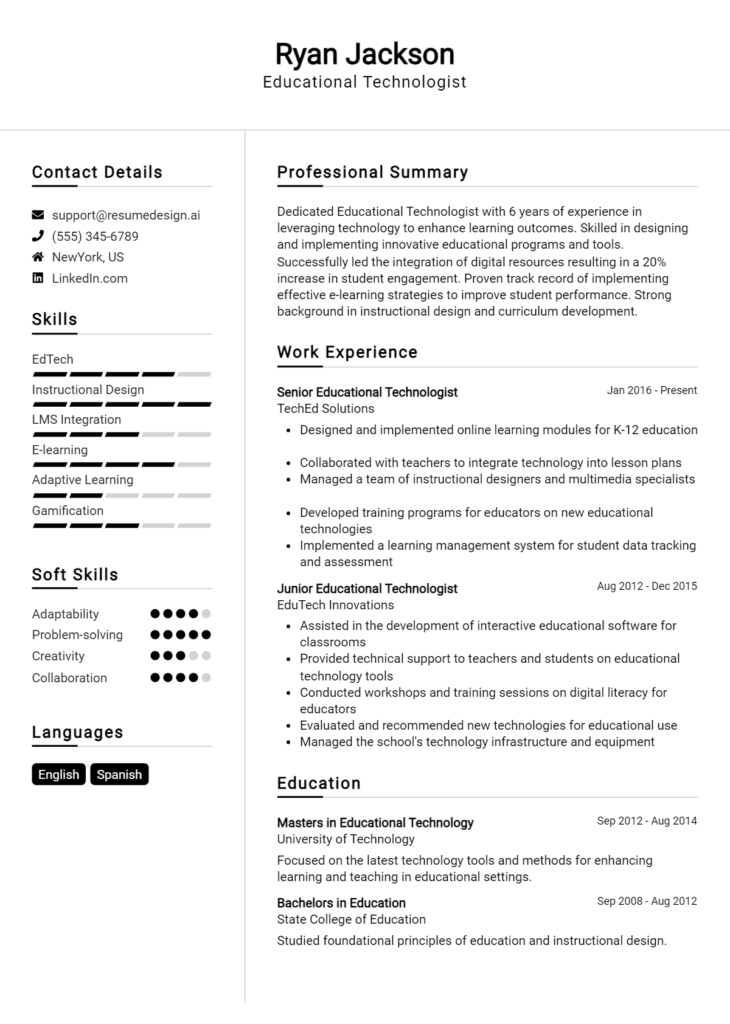Instructional Media Specialist Core Responsibilities
An Instructional Media Specialist plays a vital role in bridging various departments by integrating technology into educational practices. Key responsibilities include developing multimedia instructional materials, collaborating with faculty to enhance curriculum delivery, and providing training on technological tools. Successful specialists possess strong technical, operational, and problem-solving skills, which are essential for optimizing learning environments and achieving organizational goals. A well-structured resume that highlights these abilities can effectively demonstrate a candidate's qualifications to potential employers.
Common Responsibilities Listed on Instructional Media Specialist Resume
- Design and produce instructional materials for various learning platforms.
- Collaborate with educators to assess and implement technology in the classroom.
- Provide training and support for faculty and students on instructional technologies.
- Evaluate and recommend new educational technologies and resources.
- Maintain and troubleshoot multimedia equipment and software.
- Develop online courses and blended learning experiences.
- Conduct workshops and presentations on effective media use in education.
- Assess the effectiveness of instructional materials and strategies.
- Ensure compliance with copyright and accessibility standards.
- Manage digital assets and maintain an organized media library.
- Collaborate with IT teams to ensure seamless integration of technologies.
- Stay updated on emerging trends in educational technology and media.
High-Level Resume Tips for Instructional Media Specialist Professionals
In today's competitive job market, a well-crafted resume is crucial for Instructional Media Specialist professionals. As the first impression a candidate makes on a potential employer, your resume must effectively showcase your skills, achievements, and understanding of instructional design and media technology. A thoughtfully designed resume not only highlights your qualifications but also demonstrates your commitment to the field. This guide will provide practical and actionable tips specifically tailored for Instructional Media Specialist professionals, ensuring your resume stands out in a crowded applicant pool.
Top Resume Tips for Instructional Media Specialist Professionals
- Tailor your resume to match the job description, using keywords from the posting to highlight your relevant skills and experiences.
- Showcase your relevant experience, emphasizing your work with instructional design, multimedia production, and technology integration.
- Quantify your achievements wherever possible, such as indicating the percentage of improved learning outcomes or successful project completions.
- Highlight industry-specific skills, such as proficiency in various multimedia software, Learning Management Systems (LMS), and digital content creation tools.
- Include a strong summary statement at the top of your resume that encapsulates your expertise and career goals.
- Utilize bullet points for clarity and conciseness, making it easier for hiring managers to quickly assess your qualifications.
- Incorporate relevant certifications, such as those related to instructional design or educational technology, to bolster your credentials.
- Keep your resume visually appealing and easy to read, using consistent formatting and ample white space.
- Provide links to your professional portfolio or examples of your work, showcasing your capabilities and creative projects.
By implementing these tips, you can significantly increase your chances of landing a job in the Instructional Media Specialist field. A targeted and polished resume will not only reflect your qualifications but also convey your passion for enhancing learning through innovative media solutions, making you a compelling candidate for potential employers.
Why Resume Headlines & Titles are Important for Instructional Media Specialist
In the competitive field of instructional media, having a resume that stands out is essential for securing an interview. A well-crafted resume headline or title serves as the first impression hiring managers will have of a candidate, immediately grabbing their attention and summarizing key qualifications in a single impactful phrase. For an Instructional Media Specialist, this headline should be concise, relevant, and directly aligned with the job being applied for, effectively highlighting the applicant's unique blend of skills and experiences that make them a strong fit for the role.
Best Practices for Crafting Resume Headlines for Instructional Media Specialist
- Keep it concise—aim for a single impactful phrase.
- Make it role-specific—tailor the headline to the Instructional Media Specialist position.
- Highlight key qualifications—include relevant skills or experiences.
- Use strong action verbs to convey expertise and confidence.
- Avoid jargon—ensure clarity and accessibility for all readers.
- Incorporate keywords from the job description to align with employer expectations.
- Be authentic—reflect your true strengths and professional identity.
- Revise and refine—review multiple iterations to find the most impactful wording.
Example Resume Headlines for Instructional Media Specialist
Strong Resume Headlines
"Creative Instructional Media Specialist with 5+ Years in E-Learning Design and Development"
“Innovative Multimedia Developer Specializing in Engaging Educational Content for Diverse Learners”
“Results-Driven Instructional Designer with Proven Success in Enhancing Learning Outcomes through Technology”
Weak Resume Headlines
“Seeking Job in Education”
“Experienced Professional”
Strong resume headlines are effective because they clearly articulate the candidate's expertise and directly relate to the role of an Instructional Media Specialist, making it easy for hiring managers to recognize their fit for the position. In contrast, weak headlines fail to impress due to their vagueness and lack of specificity, leaving hiring managers with little understanding of the candidate’s strengths or relevance to the role. A compelling headline is not just a title; it is an opportunity to make a powerful first impression.
Writing an Exceptional Instructional Media Specialist Resume Summary
A well-crafted resume summary is crucial for an Instructional Media Specialist, as it serves as the first impression for hiring managers. This brief yet impactful statement encapsulates your key skills, relevant experience, and notable accomplishments, providing a snapshot of your qualifications. In a competitive job market, a strong summary quickly captures attention and sets the tone for the rest of your resume. It should be concise, directly aligned with the job you are applying for, and tailored to highlight the attributes that make you an ideal candidate.
Best Practices for Writing a Instructional Media Specialist Resume Summary
- Quantify achievements where possible to demonstrate impact.
- Focus on key skills relevant to instructional media and technology.
- Tailor the summary to reflect the specific job description.
- Use active language to convey a sense of initiative and accomplishment.
- Highlight relevant certifications or training in instructional design and media.
- Keep it concise—ideally 2-4 sentences.
- Emphasize collaboration and communication skills, essential for working with educators and stakeholders.
- Incorporate industry-specific terminology to demonstrate expertise.
Example Instructional Media Specialist Resume Summaries
Strong Resume Summaries
Results-driven Instructional Media Specialist with over 5 years of experience designing interactive e-learning modules that increased learner engagement by 30%. Skilled in utilizing multimedia tools and technologies to enhance instructional delivery, with a proven track record of collaborating with faculty to integrate innovative teaching strategies.
Dynamic Instructional Media Specialist with a Master's in Educational Technology and a history of successfully leading training workshops for over 250 educators, resulting in a 40% increase in the use of digital resources in the classroom. Adept in developing curriculum-aligned media solutions to support diverse learning needs.
Creative Instructional Media Specialist with expertise in video production and graphic design, having produced over 100 instructional videos that improved student retention rates by 25%. Committed to leveraging technology to foster an inclusive learning environment.
Weak Resume Summaries
Instructional Media Specialist with various skills and some experience in media. Looking to work in a challenging environment.
Experienced in education and media, interested in helping students learn through technology. Open to opportunities in instructional design.
The strong resume summaries stand out due to their specificity, quantifiable achievements, and relevant skills that align well with the role of an Instructional Media Specialist. They provide concrete examples of past successes and demonstrate a clear understanding of the job requirements. Conversely, the weak summaries are vague and lack measurable outcomes, making it difficult for hiring managers to ascertain the candidate's qualifications or impact in previous roles. A strong summary should always aim to engage the reader by showcasing relevant strengths and accomplishments.
Work Experience Section for Instructional Media Specialist Resume
The work experience section of an Instructional Media Specialist resume is crucial as it serves as a reflection of the candidate's technical expertise, leadership capabilities, and proficiency in delivering high-quality educational products. This section not only highlights the hands-on skills and experiences relevant to instructional design and media production but also demonstrates the ability to manage teams effectively and collaborate with diverse stakeholders. Quantifying achievements, such as project outcomes or team performance metrics, and aligning experience with industry standards are essential to make a compelling case for the candidate's suitability for the role.
Best Practices for Instructional Media Specialist Work Experience
- Focus on quantifiable achievements, such as percentage increases in learner engagement or project completion rates.
- Use industry-standard terminology to demonstrate familiarity with current trends and technologies.
- Highlight collaborative projects that showcase teamwork and cross-functional communication skills.
- Detail specific technical skills and tools utilized in each role, such as software applications or multimedia production techniques.
- Include relevant training or certifications that support your expertise in instructional design and media development.
- Tailor work experience descriptions to align with the specific requirements of the job posting.
- Emphasize leadership roles or instances where you took the initiative to improve processes or outcomes.
- Utilize action verbs to convey impact and engagement effectively.
Example Work Experiences for Instructional Media Specialist
Strong Experiences
- Led a team of 5 in the development of an interactive e-learning module, resulting in a 40% increase in learner retention rates.
- Managed a multimedia project that delivered a series of instructional videos viewed by over 10,000 users, receiving a 95% satisfaction rating.
- Collaborated with subject matter experts to design a curriculum that improved student performance by 30% within one academic year.
- Implemented a new project management tool that streamlined communication and reduced project turnaround time by 25%.
Weak Experiences
- Worked on various projects related to instructional design.
- Assisted in the development of training materials and resources.
- Participated in team meetings and contributed ideas.
- Helped with media production tasks when needed.
The examples provided illustrate the difference between strong and weak experiences. Strong experiences are characterized by specific, quantifiable outcomes and demonstrate the candidate's technical leadership and collaborative efforts, making them impactful and relevant. In contrast, weak experiences lack detail and measurable results, conveying a sense of vagueness that does not effectively showcase the candidate's true capabilities or contributions in the field of instructional media.
Education and Certifications Section for Instructional Media Specialist Resume
The education and certifications section of an Instructional Media Specialist resume plays a crucial role in showcasing the candidate's academic qualifications and professional development within the field. This section not only highlights relevant degrees and coursework, but also emphasizes industry-recognized certifications and specialized training that demonstrate a commitment to continuous learning. By providing this information, candidates can significantly enhance their credibility and align themselves more closely with the requirements of the job role, making a compelling case for their suitability for the position.
Best Practices for Instructional Media Specialist Education and Certifications
- Include only relevant degrees and certifications that pertain to instructional media or education technology.
- List advanced degrees (e.g., Master’s or Doctorate) before undergraduate degrees to emphasize higher education.
- Highlight industry-recognized certifications, such as those from ISTE or ATD, to demonstrate professional credibility.
- Provide details on specialized training or workshops that showcase new skills or technologies related to instructional design.
- Incorporate relevant coursework that directly pertains to media production, instructional design, or educational technology.
- Utilize a clear and organized format to make the education and certifications easily scannable for hiring managers.
- Update this section regularly to reflect recent educational pursuits or newly acquired certifications.
- Consider adding a brief description of significant projects or achievements related to the certifications to provide context.
Example Education and Certifications for Instructional Media Specialist
Strong Examples
- M.S. in Instructional Technology, University of Florida, 2021
- Certified Professional in Learning and Performance (CPLP), Association for Talent Development, 2022
- Coursework: Advanced Instructional Design, Multimedia Production for Education, and Learning Analytics
- Google Certified Educator Level 2, 2023
Weak Examples
- Bachelor of Arts in History, University of Somewhere, 2010
- Certification in Basic Computer Skills, 2015
- Coursework: Introduction to Philosophy and World Literature
- Old certification in Microsoft Office Suite, expired in 2018
The strong examples are considered relevant and impactful because they directly align with the qualifications and skills needed for an Instructional Media Specialist role, showcasing advanced degrees and current certifications that demonstrate expertise in the field. In contrast, the weak examples include irrelevant degrees and outdated certifications that do not contribute to the candidate's qualifications for this specific position, ultimately detracting from their overall credibility and alignment with the job requirements.
Top Skills & Keywords for Instructional Media Specialist Resume
In the competitive field of instructional media, possessing the right skills is crucial for an Instructional Media Specialist to stand out in their resume. These professionals are tasked with designing, developing, and implementing educational materials and multimedia content that enhance the learning experience. A well-crafted resume that highlights both soft and hard skills not only showcases a candidate's qualifications but also demonstrates their ability to engage learners and utilize technology effectively. By emphasizing these skills, applicants can better position themselves as valuable assets to educational institutions or organizations looking to improve their training and development programs.
Top Hard & Soft Skills for Instructional Media Specialist
Soft Skills
- Communication Skills
- Collaboration and Teamwork
- Creativity and Innovation
- Problem-Solving
- Adaptability
- Time Management
- Attention to Detail
- Empathy and Understanding of Learner Needs
- Leadership and Mentorship
- Critical Thinking
- Organizational Skills
- Flexibility
- Cultural Competence
- Conflict Resolution
- Coaching and Training Skills
- Customer Service Orientation
Hard Skills
- Instructional Design
- Multimedia Production
- Learning Management Systems (LMS) Proficiency
- Graphic Design Software (e.g., Adobe Creative Suite)
- Video Editing Software (e.g., Final Cut Pro, Camtasia)
- E-Learning Development Tools (e.g., Articulate Storyline, Captivate)
- Content Management Systems (CMS)
- Knowledge of Learning Theories and Pedagogical Approaches
- Data Analysis and Assessment Techniques
- Programming Languages (e.g., HTML, CSS)
- Project Management Software (e.g., Asana, Trello)
- Digital Asset Management
- Online Course Development
- Audio Production Techniques
- Familiarity with Accessibility Standards
- Social Media and Digital Marketing Skills
- Research Skills
Stand Out with a Winning Instructional Media Specialist Cover Letter
Dear [Hiring Manager's Name],
I am writing to express my interest in the Instructional Media Specialist position at [Company/Organization Name], as advertised on [where you found the job listing]. With a strong background in educational technology and a passion for enhancing student learning experiences through innovative media, I am excited about the opportunity to contribute to your team. My diverse skill set, combined with my commitment to fostering engaging learning environments, makes me a strong candidate for this role.
In my previous role as an Instructional Media Coordinator at [Previous Company/Organization Name], I successfully designed and implemented multimedia instructional materials that catered to diverse learning styles. I collaborated closely with educators to integrate technology effectively into the curriculum, resulting in improved student engagement and performance. My experience with various software tools, including Adobe Creative Suite and Learning Management Systems, has equipped me with the technical know-how to create dynamic resources that enhance both in-person and online learning experiences.
I am particularly drawn to [Company/Organization Name] because of its commitment to [specific value or initiative related to the company]. I admire your innovative approach to education and believe that my expertise in developing multimedia resources aligns well with your mission. I am eager to bring my creativity and problem-solving skills to your team, ensuring that all learners have access to high-quality instructional media that supports their educational journeys.
Thank you for considering my application. I look forward to the opportunity to discuss how my skills and experiences align with the needs of your team. I am excited about the possibility of contributing to [Company/Organization Name] and helping to create a vibrant and engaging learning environment for all students.
Sincerely,
[Your Name]
[Your Phone Number]
[Your Email Address]
Common Mistakes to Avoid in a Instructional Media Specialist Resume
When crafting a resume for the role of an Instructional Media Specialist, it’s essential to present your skills and experiences effectively to stand out in a competitive job market. However, many candidates make common mistakes that can undermine their chances of landing an interview. By avoiding these pitfalls, you can create a polished and impressive resume that highlights your qualifications and expertise in educational technology and instructional design.
Lack of Tailoring: Failing to customize your resume for each job application can make you appear disinterested. Tailoring your resume to align with the specific job description demonstrates that you understand the role and have the relevant skills.
Overly Technical Jargon: While it’s important to showcase your expertise in instructional media, using too much technical jargon can alienate hiring managers who may not have a deep understanding of the tools and technologies you use. Aim for clarity and simplicity.
Ignoring Quantifiable Achievements: Many candidates list responsibilities instead of highlighting achievements. Use metrics to demonstrate your impact, such as "increased student engagement by 30% through the implementation of interactive e-learning modules."
Neglecting Soft Skills: As an Instructional Media Specialist, collaboration and communication are crucial. Focusing solely on technical skills can make your resume one-dimensional. Balance your hard skills with soft skills relevant to teamwork and project management.
Poor Formatting and Organization: A cluttered or confusing layout can detract from the content of your resume. Utilize headings, bullet points, and consistent spacing to enhance readability and guide the reader’s eye through your experience.
Excessive Length: A resume that is too long can overwhelm hiring managers. Aim for a concise document that highlights your most relevant experiences and skills, generally keeping it to one or two pages.
Omitting Professional Development: Failing to include ongoing education or certifications in instructional design or technology can signal a lack of commitment to your professional growth. Show that you stay current with trends and advancements in the field.
Spelling and Grammar Errors: Typos and grammatical mistakes can undermine your professionalism. Always proofread your resume or have someone else review it to ensure it is error-free and polished.
Conclusion
As we explored the essential skills and responsibilities of an Instructional Media Specialist, it became clear that proficiency in multimedia tools, effective communication, and collaboration with educators are vital for success in this role. The ability to design engaging instructional materials and leverage technology to enhance learning experiences is paramount. Furthermore, staying updated on the latest trends in educational technology can significantly impact your effectiveness and career advancement.
Now is the perfect time to take a closer look at your Instructional Media Specialist resume. Make sure it highlights your skills, experiences, and achievements relevant to this role. If you're seeking assistance in crafting or updating your resume, a variety of resources are available to help you present your qualifications effectively. Check out these valuable tools:
- Explore a range of resume templates that can give your resume a professional edge.
- Use the resume builder to create a polished resume tailored to your unique experiences.
- Review resume examples to gain inspiration and insight into effective formats and wording.
- Don't forget to prepare a strong introduction with the help of cover letter templates that complement your resume and showcase your passion for instructional media.
Take action now—revise your resume and utilize these tools to ensure you stand out in the competitive field of instructional media. Your next career opportunity awaits!

